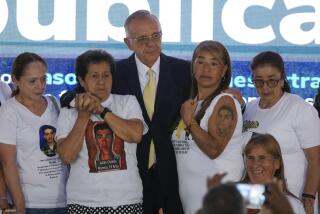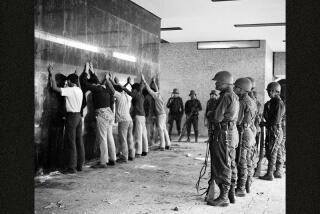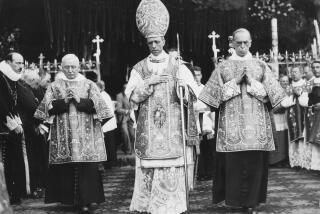Confession Reopens Wounds of Argentina’s ‘Dirty War’ : Rights: Ex-officer’s tale of dissidents thrown to their deaths by the hundreds brings demands for more information.
- Share via
BUENOS AIRES — Argentina’s wounds from a “dirty war” in the late 1970s were open and aching again Tuesday as 200 to 300 people demonstrated quietly in front of the presidential palace.
The gathering was part of an outpouring of old pain and anger that has been evoked by recent confessions of a retired navy officer who said political prisoners were thrown from airplanes into the sea when this country was under military rule.
The demonstrators demanded that the armed forces account for those and thousands of other people still missing from the dirty war. The truth is needed, a speaker said, “to give a minimum of satisfaction to the thousands of families sacrificed in this veritable holocaust.”
Military and police forces seized and tortured thousands of suspected subversives in the dirty war from the late 1970s to the early 1980s. Estimates of the number of “disappeared” prisoners range from 9,000 to 30,000.
In an interview published last week, former Lt. Cmdr. Adolfo Francisco Scilingo estimated that 1,500 to 2,000 prisoners were killed during naval flights in 1976 and 1977. Such flights had been reported by human rights groups and former political prisoners but never openly by a military official and in such chilling detail as Scilingo gave.
He said naval officers from throughout the country were given turns of duty on the flights. He admitted participating in two.
Every Wednesday, a plane took off from Buenos Aires carrying 15 to 20 “subversives” who were told they were being transferred to southern Argentina, he said. Before leaving, prisoners received sedatives in the guise of vaccinations, then were helped aboard a plane like “zombies.” When the plane was airborne and the prisoners were unconscious from more injections, officers stripped them and “they were thrown out naked, one by one,” he said.
He recalled that after his first flight, he spoke to a Catholic chaplain. “He said it was a Christian death because they didn’t suffer, because it wasn’t traumatic, that they had to be eliminated, that war was war, and even that in the Bible the separation of the wheat from the chaff is foreseen,” Scilingo said.
He told his story to investigative journalist Horacio Verbitsky, who published it last week in a book, “The Flight,” and in the newspaper Pagina 12. Since then, the Argentine press has been a daily forum of painful reflection on that dark period of the country’s past.
This week, Catholic Bishop Justo Laguna said that if members of the clergy condoned the death flights, “I sincerely ask forgiveness. . . . It is necessary to recognize guilt, not of the church, which is holy, but of its members, who are not saints.”
Adm. Enrique Molina Pico, chief of the navy, has not denied the death-flight allegations, but a radiogram from Molina Pico to all navy units said Scilingo’s statements were aimed at “reopening wounds. This is a step backward.”
President Carlos Menem dismissed Scilingo’s allegations on Monday. “The assertions by this individual were made without proof and are not reliable because they were made by a delinquent who was convicted several times for falsifying documents, fraud and car theft,” he said.
Scilingo has said he once bought a car without knowing it was stolen and was convicted on a minor fraud charge because he vouched for a person who later wrote a bad check of less than $100.
At Tuesday’s demonstration outside the presidential palace, human rights activist Emilio Mignone said Scilingo’s allegations were undeniable. Mignone said he had heard similar reports from hundreds of former political prisoners and from relatives of military personnel. In the late 1970s, he added, numerous unidentifiable bodies washed up on the Atlantic shores of Argentina and neighboring Uruguay. “I have seen at least 30 corpses, or remains of corpses,” he said.
After the demonstration Tuesday, Mignone and other human rights leaders delivered a petition to the palace, demanding that Menem order the armed forces to produce documentation accounting for disappeared political prisoners. Mignone said he believes such documentation is on microfilm held by the army intelligence agency.
More to Read
Sign up for Essential California
The most important California stories and recommendations in your inbox every morning.
You may occasionally receive promotional content from the Los Angeles Times.













